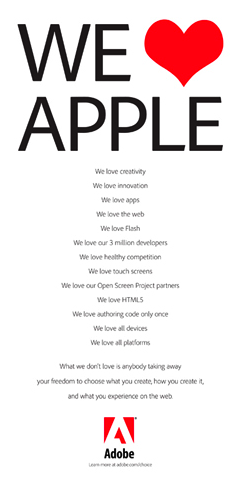—
(展雯)
Only can write three essays one day.
英语角每日限发3篇主题。
由于您在5月16日这天共发主题九篇。
因此,本篇主题不予评分。
谢谢您对英语角的支持。
详情见英语角版规。 (2010-05-17 17:30) —
英语角每日限发3篇主题。
由于您在5月16日这天共发主题九篇。
因此,本篇主题不予评分。
谢谢您对英语角的支持。
详情见英语角版规。 (2010-05-17 17:30) —
14 May 2010
In response to Apple co-founder Steve Jobs' open letter to Adobe on Apple's official website, Adobe has replied, but this time, with love.
In a similar way to Jobs', Adobe has decided to run its letter on its official website lined with 'We ♥ Choice'.
However, Adobe has further went on to extend its expression of love to Apple via a major 'We ♥ Apple' advertising campaign splashed across major newspapers across the United States.

Here's what Adobe Founders Chuck Geschke and John Warnock had to say.
"At Adobe, we believe open markets are in the best interest of developers, content owners, and consumers. Freedom of choice on the web has unleashed an explosion of content and transformed how we work, learn, communicate, and, ultimately, express ourselves."
"We believe that Apple, by taking the opposite approach, has taken a step that could undermine this next chapter of the web — the chapter in which mobile devices outnumber computers, any individual can be a publisher, and content is accessed anywhere and at any time.
In the end, we believe the question is really this: Who controls the World Wide Web? And we believe the answer is: nobody — and everybody, but certainly not a single company."
In response to Apple co-founder Steve Jobs' open letter to Adobe on Apple's official website, Adobe has replied, but this time, with love.
In a similar way to Jobs', Adobe has decided to run its letter on its official website lined with 'We ♥ Choice'.
However, Adobe has further went on to extend its expression of love to Apple via a major 'We ♥ Apple' advertising campaign splashed across major newspapers across the United States.

Here's what Adobe Founders Chuck Geschke and John Warnock had to say.
"At Adobe, we believe open markets are in the best interest of developers, content owners, and consumers. Freedom of choice on the web has unleashed an explosion of content and transformed how we work, learn, communicate, and, ultimately, express ourselves."
"We believe that Apple, by taking the opposite approach, has taken a step that could undermine this next chapter of the web — the chapter in which mobile devices outnumber computers, any individual can be a publisher, and content is accessed anywhere and at any time.
In the end, we believe the question is really this: Who controls the World Wide Web? And we believe the answer is: nobody — and everybody, but certainly not a single company."
